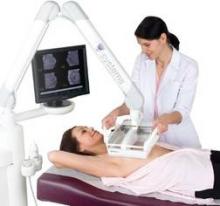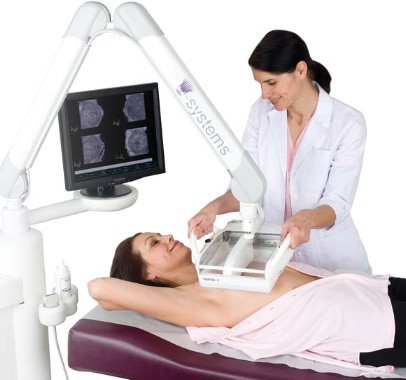User login
The first ultrasound device to boost breast cancer detection in women with dense breasts won approval Sept. 18 from the Food and Drug Administration as a screening tool for use in combination with standard mammography.
The somo-v Automated Breast Ultrasound System (ABUS) device was approved in 2005 as an adjunct to mammography. This new decision broadens its authorized use to asymptomatic women who have no evidence of breast cancer and whose mammograms are negative.
Whether a woman has dense breasts would be determined by a physician, according to the FDA announcement. Women who have had a previous clinical breast intervention, such as a surgery or biopsy, would not be eligible for the device, "since this might alter the appearance of breast tissue in an ultrasound image," the FDA said.
Breast cancer detection by mammography is more challenging in dense breasts, which have a high amount of fibroglandular tissue, as compared with the fatty tissue seen in less-dense breasts. "Fibroglandular breast tissue and tumors both appear as solid white areas on mammograms. As a result, dense breast tissue may obscure smaller tumors, potentially delaying detection of breast cancer," the FDA noted in its announcement.
A recent study reported dense breasts do not increase risk of death from breast cancer, but that dense breasts are associated with greater risk of developing the disease (J. Natl. Cancer Inst. 2012 [doi:10.1093/jnci/djs327]).
In addition, lobbying efforts have sought to mandate that mammography reports notify women who have dense breasts that they may benefit from additional screening.
The go-ahead for ultrasound screening follows a unanimous 13-0 endorsement in April from the agency’s Radiological Devices Panel. That advisory group agreed that the device’s benefits outweigh any risks for breast cancer screening. The FDA had been concerned about the generalization of a pivotal study to a broad population but the panel deemed the noninvasive device to be safe and effective.
The retrospective multireader study involved 200 women at 13 U.S. sites. All had dense breasts, and reviews by board-certified radiologists showed a statistically significant increase in breast cancer detection when the device was used with mammography as compared with mammography alone.
As a condition of approval, Sunnyvale, Calif.–based U-Systems Inc., which makes the device, must provide thorough training for physicians and technologists, and provide facilities with "a manual clearly defining system tests required for initial, periodic, and yearly quality control measures."
"Enabling radiologists to use the information obtained from mammography and integrate that with the information obtained with ultrasound, leverages the potential of ABUS in a screening environment to find the 30% additional cancers that would not have been found with mammography alone," said Ron Ho, president and CEO of U-Systems, maker of the somo-v ABUS. "Research shows that ABUS can help find cancer in women with dense breasts, and that the cancers are smaller and early stage. With formal approval, we are moving rapidly from development to commercialization and look forward to making the somo-v ABUS system more widely available across the United States."
The first ultrasound device to boost breast cancer detection in women with dense breasts won approval Sept. 18 from the Food and Drug Administration as a screening tool for use in combination with standard mammography.
The somo-v Automated Breast Ultrasound System (ABUS) device was approved in 2005 as an adjunct to mammography. This new decision broadens its authorized use to asymptomatic women who have no evidence of breast cancer and whose mammograms are negative.
Whether a woman has dense breasts would be determined by a physician, according to the FDA announcement. Women who have had a previous clinical breast intervention, such as a surgery or biopsy, would not be eligible for the device, "since this might alter the appearance of breast tissue in an ultrasound image," the FDA said.
Breast cancer detection by mammography is more challenging in dense breasts, which have a high amount of fibroglandular tissue, as compared with the fatty tissue seen in less-dense breasts. "Fibroglandular breast tissue and tumors both appear as solid white areas on mammograms. As a result, dense breast tissue may obscure smaller tumors, potentially delaying detection of breast cancer," the FDA noted in its announcement.
A recent study reported dense breasts do not increase risk of death from breast cancer, but that dense breasts are associated with greater risk of developing the disease (J. Natl. Cancer Inst. 2012 [doi:10.1093/jnci/djs327]).
In addition, lobbying efforts have sought to mandate that mammography reports notify women who have dense breasts that they may benefit from additional screening.
The go-ahead for ultrasound screening follows a unanimous 13-0 endorsement in April from the agency’s Radiological Devices Panel. That advisory group agreed that the device’s benefits outweigh any risks for breast cancer screening. The FDA had been concerned about the generalization of a pivotal study to a broad population but the panel deemed the noninvasive device to be safe and effective.
The retrospective multireader study involved 200 women at 13 U.S. sites. All had dense breasts, and reviews by board-certified radiologists showed a statistically significant increase in breast cancer detection when the device was used with mammography as compared with mammography alone.
As a condition of approval, Sunnyvale, Calif.–based U-Systems Inc., which makes the device, must provide thorough training for physicians and technologists, and provide facilities with "a manual clearly defining system tests required for initial, periodic, and yearly quality control measures."
"Enabling radiologists to use the information obtained from mammography and integrate that with the information obtained with ultrasound, leverages the potential of ABUS in a screening environment to find the 30% additional cancers that would not have been found with mammography alone," said Ron Ho, president and CEO of U-Systems, maker of the somo-v ABUS. "Research shows that ABUS can help find cancer in women with dense breasts, and that the cancers are smaller and early stage. With formal approval, we are moving rapidly from development to commercialization and look forward to making the somo-v ABUS system more widely available across the United States."
The first ultrasound device to boost breast cancer detection in women with dense breasts won approval Sept. 18 from the Food and Drug Administration as a screening tool for use in combination with standard mammography.
The somo-v Automated Breast Ultrasound System (ABUS) device was approved in 2005 as an adjunct to mammography. This new decision broadens its authorized use to asymptomatic women who have no evidence of breast cancer and whose mammograms are negative.
Whether a woman has dense breasts would be determined by a physician, according to the FDA announcement. Women who have had a previous clinical breast intervention, such as a surgery or biopsy, would not be eligible for the device, "since this might alter the appearance of breast tissue in an ultrasound image," the FDA said.
Breast cancer detection by mammography is more challenging in dense breasts, which have a high amount of fibroglandular tissue, as compared with the fatty tissue seen in less-dense breasts. "Fibroglandular breast tissue and tumors both appear as solid white areas on mammograms. As a result, dense breast tissue may obscure smaller tumors, potentially delaying detection of breast cancer," the FDA noted in its announcement.
A recent study reported dense breasts do not increase risk of death from breast cancer, but that dense breasts are associated with greater risk of developing the disease (J. Natl. Cancer Inst. 2012 [doi:10.1093/jnci/djs327]).
In addition, lobbying efforts have sought to mandate that mammography reports notify women who have dense breasts that they may benefit from additional screening.
The go-ahead for ultrasound screening follows a unanimous 13-0 endorsement in April from the agency’s Radiological Devices Panel. That advisory group agreed that the device’s benefits outweigh any risks for breast cancer screening. The FDA had been concerned about the generalization of a pivotal study to a broad population but the panel deemed the noninvasive device to be safe and effective.
The retrospective multireader study involved 200 women at 13 U.S. sites. All had dense breasts, and reviews by board-certified radiologists showed a statistically significant increase in breast cancer detection when the device was used with mammography as compared with mammography alone.
As a condition of approval, Sunnyvale, Calif.–based U-Systems Inc., which makes the device, must provide thorough training for physicians and technologists, and provide facilities with "a manual clearly defining system tests required for initial, periodic, and yearly quality control measures."
"Enabling radiologists to use the information obtained from mammography and integrate that with the information obtained with ultrasound, leverages the potential of ABUS in a screening environment to find the 30% additional cancers that would not have been found with mammography alone," said Ron Ho, president and CEO of U-Systems, maker of the somo-v ABUS. "Research shows that ABUS can help find cancer in women with dense breasts, and that the cancers are smaller and early stage. With formal approval, we are moving rapidly from development to commercialization and look forward to making the somo-v ABUS system more widely available across the United States."

